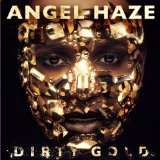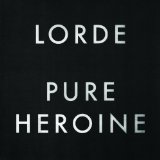 Angel Haze is an exciting prospect. The 22 year old rapper and sometimes singer from Detroit’s flow is like an exhilarating and effortless amphetamine hit; you hear her, you sit up and you ask ‘who?’ Her story is one of cult religions, abuse and an exploration of her sexuality and sexual orientation and how all of these things have resolutely not made her into a victim. After several mix tapes it was 2012’s unexpectedly diverse and brilliant “Reservation” and her covers EP “Classick”, both exploring all of these experiences, that guaranteed she could no longer go unheard. Her biggest hit to date, the skeletal and booming “New York” has now become a club essential and a classic in itself. So why exactly does “Dirty Gold”, Angel Haze’s first official album release sound like such a step backwards?
Angel Haze is an exciting prospect. The 22 year old rapper and sometimes singer from Detroit’s flow is like an exhilarating and effortless amphetamine hit; you hear her, you sit up and you ask ‘who?’ Her story is one of cult religions, abuse and an exploration of her sexuality and sexual orientation and how all of these things have resolutely not made her into a victim. After several mix tapes it was 2012’s unexpectedly diverse and brilliant “Reservation” and her covers EP “Classick”, both exploring all of these experiences, that guaranteed she could no longer go unheard. Her biggest hit to date, the skeletal and booming “New York” has now become a club essential and a classic in itself. So why exactly does “Dirty Gold”, Angel Haze’s first official album release sound like such a step backwards?
It may take a while to pull your already-established fan base along with you, but the decision to move from the relatively underground to the mainstream is not necessarily bad. It’s apparent after hearing the opening track, the scene-setting “Sing About Me” that Angel Haze wants to make it big as a crossover act; not as a rap artist or a hip-hop artist but as a pop star. Listening to recent interviews and the snippets of dialogue contained through “Dirty Gold” this indeed would appear to be Haze’s choice. Beginning with a sung chorus, shimmering synths and a repetitive R2D2 whistle, “Sing About Me”, is uplifting and pleasant but completely derivative r’n’b pop. With sing-song rapped verses, Haze encourages us to celebrate her success and this formula of sung chorus and rapped verse is repeated almost throughout the entirety of the tracks on “Dirty Gold”. On the third song, “A Tribe Called Red”, a trapped-out and dub-stepped rhythm supports Haze’s rap spit efficiently enough but then is completely compromised and crushed by the excruciatingly heavy-handed (sung) chorus telling the listener ‘Don’t give up…turn it around’. It already sounds dated; the EDM ticks, the histrionics and the self-empowering sentiment.
As if any further confirmation were required, the presence of omnipresent songwriter and pop star in her right, Sia, both singing and writing on “Battle Cry” (the hands in the air chorus actually states ‘lift your hands towards the sky’) and with production by equally in-demand Greg Kurstin (Kylie, Britney and Lily Allen), there is no doubt that Haze is aiming stadium big. But even with such dependable collaborators the overall sound of this is overwrought and clichéd, particularly in the slower and more ‘serious’ second half. The most obvious comparison is that of Nicki Minaj who, like Haze, released early mix tapes and through thunder-stealing features proved herself as a gloriously eccentric, genuinely witty and charismatic performer and then her debut “Pink Friday” appeared and it was sonically safe, overly sentimental and, worst of all, dull. The Minaj that was initially promised was not the Minaj delivered and the Angel Haze that we expected has similarly been mislaid somewhere in transit.
There are moments of “Dirty Gold” that do work well within this new format. The first single taken from the album, the Markus Dravs-produced (Bjork, Arcade Fire and Coldplay, amongst others) “Echelon (It’s My Way)” sounds fresh and relevant. It has the best chorus on “Dirty Gold” by some distance and its trap styling and deceptively shallow subject matter (fashion, basically) are pretty perfunctory – it’s pretty much the second instalment to ASAP Rocky’s “Fashion Killa” – but on an album that is looking for instant pop gratification and perfect hooks this does the trick very well. “Deep Sea Diver” has a tight groove and throbs and rattles like prime time Missy Elliott and “White Lilies/White Lies” has breadth and an epic feel that moves away from the more predictable structures found here with the spaghetti western-type loop and long instrumental fadeout adding atmosphere.
It’s maybe important to point out that the deluxe version of this album, and I am loath to review these ‘versions’, which are essentially just marketing tools and undoubtedly cynical, contains four of the most compelling, sonically-challenging and vibrant tracks contained under the “Dirty Gold” banner. Admittedly one of these is the previously-released “New York”, but listen to the baroque and oddly beautiful “Rose-Tinted Suicide” and marvel at what could (should) have been achieved. The decision to still include these tracks, albeit in this unabridged version of the album, confirms that the young star’s talent is still very much intact. It might be of course that Angel Haze herself wants to distance herself from these more nuanced and disturbing tracks but one can only hope that she changes her mind and finds again the bright light that’s hidden beneath the dirt here, the one that attracted us to her in the first place. The three-star rating is based on the Deluxe Edition.
 The troubling thing about Lorde is that she’s only sixteen, about to turn seventeen at the time of writing. This, her debut album, sounds like the work of someone in their mid-twenties which isn’t exactly middle aged either but the experience that comes with age does help reinforce artistic credibility, it seems. But this a prejudice and should therefore be discounted. Childhood and very early adulthood is experienced differently based on environmental and social factors and kids are no longer just kids; the definition has become blurred. Exposure to almost everything is effortlessly achieved whether you are in control of what you are experiencing or not and kids now worry about feeling too old, to quote Lorde here, at the age of 16. Her worry is our worry, her talent is that she knows how to create brilliant, massive pop songs.
The troubling thing about Lorde is that she’s only sixteen, about to turn seventeen at the time of writing. This, her debut album, sounds like the work of someone in their mid-twenties which isn’t exactly middle aged either but the experience that comes with age does help reinforce artistic credibility, it seems. But this a prejudice and should therefore be discounted. Childhood and very early adulthood is experienced differently based on environmental and social factors and kids are no longer just kids; the definition has become blurred. Exposure to almost everything is effortlessly achieved whether you are in control of what you are experiencing or not and kids now worry about feeling too old, to quote Lorde here, at the age of 16. Her worry is our worry, her talent is that she knows how to create brilliant, massive pop songs.
There are two very big songs on the seductive, and that it is the right word, “Pure Heroine”. The bigger of the two, “Tennis Court”, begins with Lorde asking the question ‘don’t you think that’s it boring when people talk?’ Although the statement itself is nonsensical without context, she has already stared you straight on and in the space of five seconds you’re captive. Against a bare hip hop beat, wide screen synths and the lonely sound of a repeated and dominant ‘blip blip’ from an imagined early computer game (Atari tennis would be topical of course), the steely-eyed verse can only serve as a perfect appetiser for the sublime chorus. Punctuated by a drunk and slowed down ‘yeah!’ borrowed from the current rap sound favoured by ASAP Rocky and already hijacked by Miley, Lorde is intoxicatingly confident and dominates the song’s boulder-like hook. Interesting that the current number one in the USA, the appropriately majestic “Royals”, and the second very big song here, is lyrically a reaction against hip hop culture which, in the States at least, is a dominant chunk of popular culture (see Miley again). It’s all rumbles and clicks, equal parts Peggy Lee, Lana Del Rey and Lykke Li (vocally they sound very similar, you would never imagine that Lorde is American let alone a New Zealander) but musically it’s as much a classic Rihanna song as anything else currently in the top ten, more “Umbrella” than “Only Girl in the World”.
The remaining eight songs on the self-written “Pure Heroine” are variations on the musical and lyrical themes established in these two songs and apart from a couple of misfires (the album closer ,”A World Alone”, is too heavy-handed in its attempts to demonstrate one of the album’s key subjects of alienation) the quality is very high throughout. The cleverly repetitious “Ribs” is the only track with a recurring and solid dance beat but is drenched in teen melancholy and on the booming and hypnotic “Team”, Lorde lyrically avoids the tirelessly reproduced ‘up in the club’ line by announcing ‘I’m kinda over being told to throw my hands in the air’. “Glory and Gore”, probably owing the most to Del Rey (the ultimate magpie) divides verses up sonically between hip hop via The XX cut with indie pop percussion practices of seemingly banging hard on a saucepan. These clever and effective musical tricks, and there are many, help what could have been a samey-sounding set remain fresh and inventive. “White Teeth Teens” has a 60’s girl group roll and sneer until the confessional line ‘I’ll let you into something big, I’m not a white teeth teen, I tried to join but never did, the way they are and the way they seem; it’s something in the blood’. “Buzzcut Season” contains the lovely line ‘I remember when your head caught flame, it kissed your scalp and caressed your brain’ and demonstrates Lorde’s skill with words, lyrics that can create a fluid and beautiful image.
The worldwide success of Ellie Maria Lani Yelich-O’Connor, her real name, puts her in the post, post-modern situation of becoming what she appears to at least mock here and, at times, hate. A star who is, because of her ability to not only perform but also write and reproduce, is a highly desirable commodity. There is an innocence to Lorde’s “Pure Heroine” which she will be unable to return to, her school friends and their anti-gang, their language and rejection of the mainstream; now she is the mainstream. Her ability to compose and express these experiences in such an accessible and grounded but haunting style may be her downfall but our gain. Ultimately Lorde will just have to decide just how far she wants to go as at the moment there really would appear to be no limits for this extremely talented and intriguing young woman.


